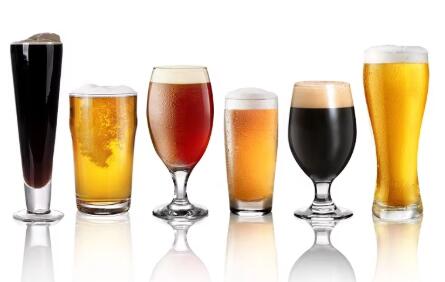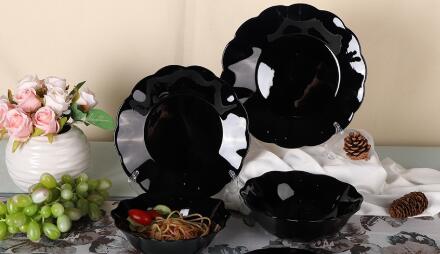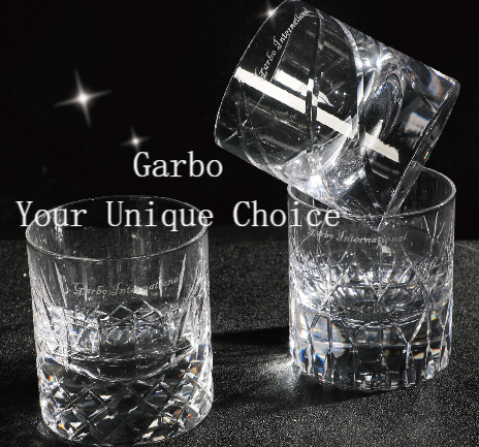Brand new design Midlle East style glass tea cup
Pulished on Jun. 19, 2024The Middle East style decal design glass tea cup represents a fusion of tradition and artistry, embodying the rich cultural heritage of the Middle East. These tea cups are not just vessels for beverages; they are a testament to centuries-old customs, intricate craftsmanship, and aesthetic sensibilities that have evolved over time. This essay explores the historical significance, design elements, cultural symbolism, and modern interpretations of Middle Eastern decal design glass tea cups.
Below i will attach some own decal design Middle East style by GARBO glassware, also i will introduce you more information about the glass tea cup. for our glass tea cup with decal we made into high quality and luxury, we use a lot golden and silver color on the decal, also package with a luxury gift box pack.
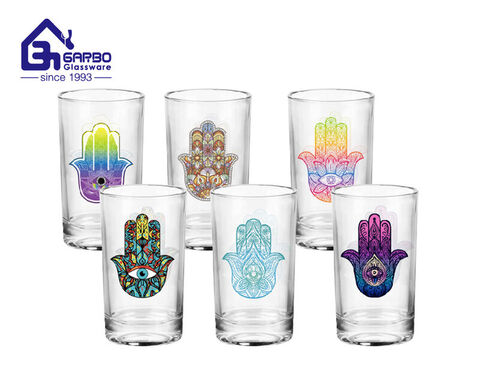
Tea drinking in the Middle East is more than a mere social activity; it is a deeply rooted cultural tradition. The use of glass tea cups dates back centuries, with origins in countries such as Turkey, Iran, and the Arabian Peninsula. These regions have long been known for their exquisite glassware, often adorned with intricate designs and patterns that reflect the artistry of the era. The introduction of decal designs, which are essentially printed patterns applied to the surface of the glass, brought a new dimension to this tradition, allowing for more detailed and elaborate decorations.
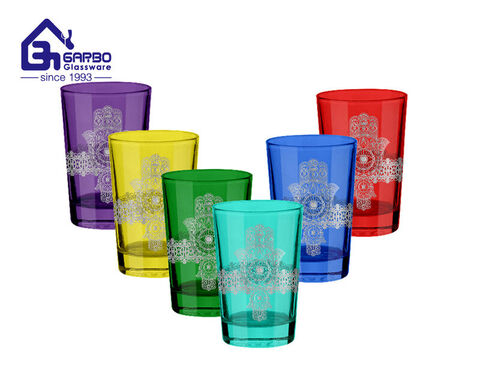
Middle Eastern decal design glass tea cups are characterized by their intricate and often symmetrical patterns, which can include geometric shapes, floral motifs, and calligraphy. These designs are not only visually appealing but also hold symbolic meanings. For instance, geometric patterns, such as those found in Islamic art, are meant to represent the infinite nature of Allah, with their repetitive and unending forms.
Floral motifs are also prevalent, symbolizing the beauty of nature and the divine creation. Common flowers depicted in these designs include roses, tulips, and carnations, each with its own cultural significance. Calligraphy, often featuring Arabic script, adds a layer of spiritual and poetic depth to the designs. Verses from the Quran or famous poems might be elegantly inscribed, transforming the tea cup into a piece of art that communicates profound messages.
In the Middle East, serving tea in beautifully designed glass cups is a gesture of hospitality and respect. The tea cup itself becomes a medium through which the host expresses warmth and generosity. The detailed designs are not merely decorative but serve to enhance the overall experience of tea drinking, making it a moment of reflection and appreciation for the guest.
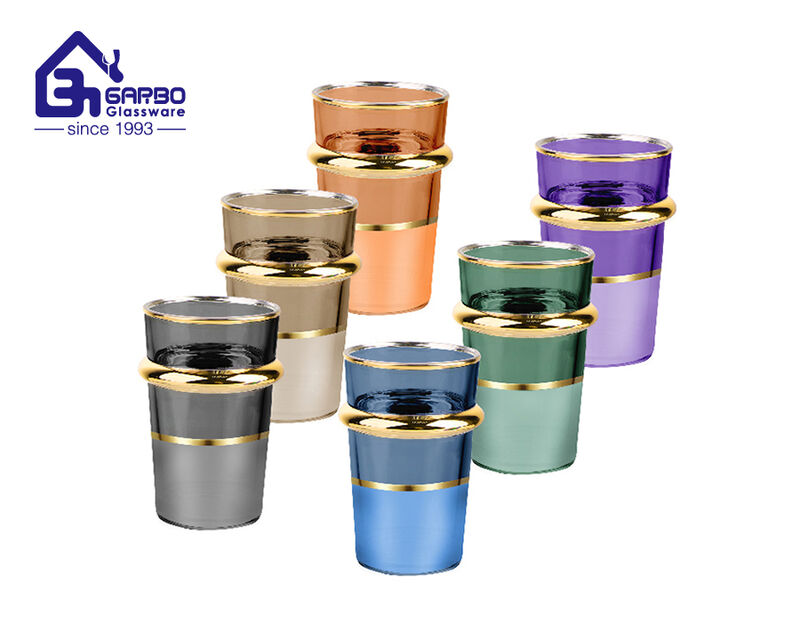
The use of specific colors in the decal designs also carries cultural significance. Gold, a common color in these designs, symbolizes wealth, prosperity, and divine light. Blue represents tranquility and spirituality, while green is associated with paradise and is a revered color in Islamic culture. These color choices are not arbitrary but are deeply embedded in the cultural and religious fabric of Middle Eastern societies.
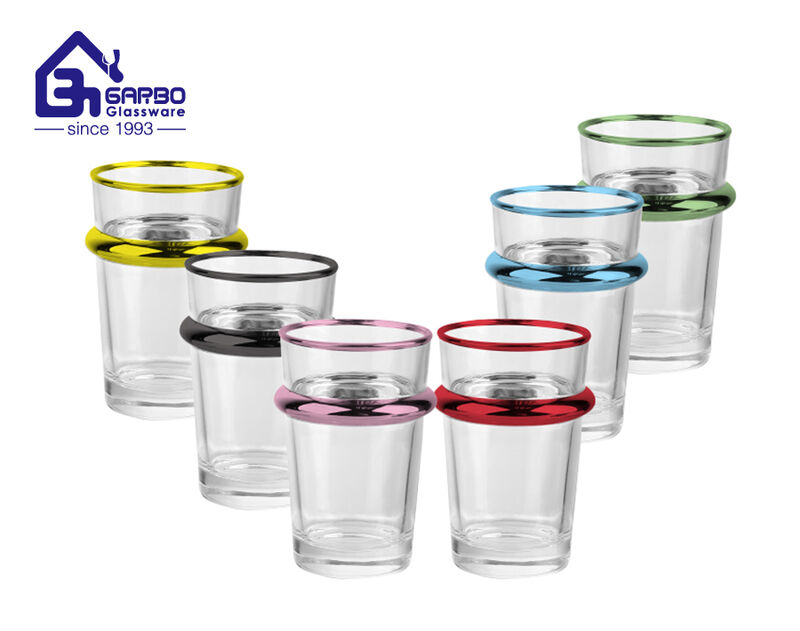
While traditional designs remain popular, contemporary artists and designers have begun to experiment with new themes and techniques, blending traditional elements with modern aesthetics. This has led to the creation of unique tea cups that appeal to a global audience, bridging the gap between ancient traditions and contemporary tastes.
For example, modern decal designs may incorporate abstract art, minimalist patterns, or even fusion styles that combine Middle Eastern motifs with elements from other cultures. This evolution reflects the dynamic nature of Middle Eastern art, which continues to adapt and thrive in a changing world. The advent of advanced printing technologies has also allowed for more precise and durable decal applications, ensuring that the intricate designs remain vibrant and intact even with regular use.
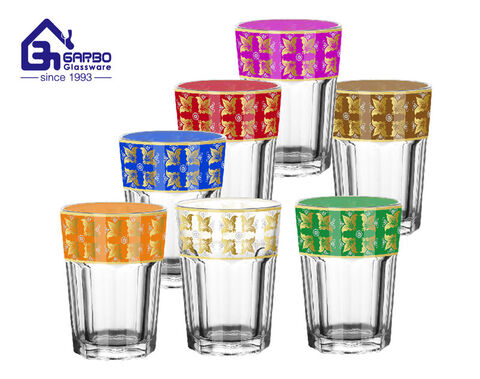
The Middle East style decal design glass tea cup is more than just a practical item; it is a reflection of a rich cultural heritage and a symbol of hospitality and artistry. The intricate designs, steeped in historical and cultural significance, transform these tea cups into cherished pieces of art. As modern interpretations continue to emerge, these tea cups remain a testament to the enduring beauty and adaptability of Middle Eastern craftsmanship. Whether used in traditional settings or contemporary contexts, they continue to enchant and inspire, connecting people to the timeless traditions of the Middle East.







